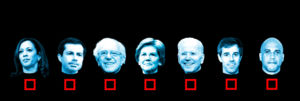After 2016 heartburn, labor unions take their time with political endorsement

Labor union leaders are in no rush to endorse a 2020 Democratic presidential candidate. Aside from the fact there are still too many candidates in the running, an early endorsement could also recreate the tension and criticism unions faced in the 2016 presidential election with their decision to back Hillary Clinton over Bernie Sanders.
For example, teachers in Minnesota who “felt the Bern” were forced to be “with her,” as the state’s teachers’ union Education Minnesota and its national affiliates the National Education Association and the American Federation of Teachers supported Hillary Clinton and the DNC. What about teachers who supported one of the Republican candidates, or teachers who did not support any candidate? Unfortunately, the varying political ideologies of teachers’ union members doesn’t stop the union from advancing its own agenda.
But Hillary didn’t win, and union leaders were left to lick their wounds and revise their endorsement process for the 2020 primary. Hence, the teachers’ union taking it slow this time around. And, according to the Washington Examiner, the American Federation of Teachers’ new endorsement policies could mean there is a “distinct chance that it won’t unveil any endorsements at all.”
As of right now, a spokesman for the AFT told the Washington Examiner, the organization isn’t close to making any decisions.
…
Added to concerns that unpopular endorsements could alienate members is the Janus Supreme Court decision. The ruling allowed individuals in the public sector not to pay union dues even if they weren’t members. Any dissatisfaction with an endorsement could provide more incentives for employees to leave the union or not pay their dues.
“Janus has forced unions to be more responsible to their members. They’re not taking financial support for granted anymore,” said Steve Early, a labor organizer and co-founder of the 2016 group Labor for Bernie. “Endorsements have usually been decided in a top-down fashion, they haven’t been democratic in who they endorse. The unions that endorsed Hillary took a lot of flack. Now they’re being more cautious.”
It took a gun-to-their-head Supreme Court case for public sector unions to stop taking their members and their hard-earned money for granted. But many members are still dissatisfied their union seems more caught up in a political game than serving their professional needs. As dues-paying members continue to slip through unions’ fingers, union leaders should think long and hard about what’s at stake by continuing to promote a one-sided political agenda.